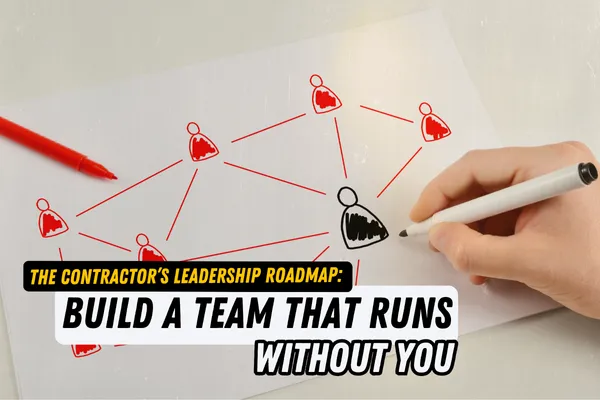
The Contractor’s Leadership Roadmap: Build a Team That Runs Without You
The Contractor’s Leadership Roadmap: Build a Team That Runs Without You
Introduction: Why Contractors Struggle with Letting Go
If you’re a contractor who feels like you have to do it all—check every detail, oversee every job, answer every question—you’re not alone. Most contractors don’t start out wanting to micromanage. It just happens. One day, you realize your business can’t function without you. You’re exhausted, working nights and weekends, putting out fires that shouldn’t be yours to fight.
I’ve been there. When I ran our brewery, I thought if I wasn’t doing it, it wouldn’t get done right. That mindset trapped me in 100+ hour weeks, drained and frustrated. Contractors are builders—you build homes, systems, structures—but building a team you can trust to run without you? That’s less clear. You’re not lazy; you’re over-functioning. And the more you control, the more your team underperforms.
Micromanagement isn’t leadership—it’s a reaction to a lack of clarity. Without addressing this, your business won’t grow beyond what you can personally handle. This guide will give you practical steps, and if you want deeper support, my Contractor’s Roundtable Mastermind is designed to help contractors build profitable, self-managing teams.
Key Takeaways
Micromanagement Is a Hidden Liability Constantly fixing problems trains your team to rely on you, leading to burnout and stunted growth.
Clarity Drives Accountability Performance issues stem from unclear expectations, not lack of motivation. Clear outcomes foster ownership.
SOPs Need a System Static SOPs gather dust. A dynamic Contractor Operating System ties routines, communication, and feedback together.
Questions Spark Engagement Outcome-focused questions encourage curiosity, leadership, and problem-solving in your team.
Shift from Operator to Leader If your business needs you for everything, you’re operating, not leading. Empower others to grow.
Small Rituals Build Culture Simple habits like acknowledging effort create peer accountability and boost morale.
Systems Should Empower Flexible, outcome-driven systems enable confident decisions, not rigid rules.
Freedom Comes from Self-Management A self-managing team lets you work less, take vacations, and feel like a true owner.
It Starts With You Your mindset shapes your business. Model leadership by creating clarity and trusting systems.
The Cost of Micromanaging: What It’s Really Costing You
Micromanaging feels like control, but it’s draining your business. Every time you fix a mistake, answer a question, or complete a task for someone else, you train your team to depend on you. That dependence is costly—delaying jobs, piling up errors, and keeping you working late to catch up.
Contractors often say, “I can’t afford to step back.” But you can’t afford not to. Micromanagement slows growth, limits your team, and kills profitability. Think about it: unbilled hours from inefficiencies, rework from miscommunications, and missed bids because you’re stuck in the weeds. High-performers don’t want to be babysat—they want clear goals and trust to deliver. Micromanaging pushes them away, leaving you with a team that needs constant direction.
“Micromanagement isn’t leadership—it’s a reaction to a lack of clarity.”
I’ve coached contractors stuck in this cycle. One lost a top foreman because he couldn’t make decisions without approval, costing thousands in turnover. Once we identified the hidden costs—missed jobs, stress-related errors—it was clear: micromanaging is a liability. If you’re overwhelmed and still not hitting your numbers, calculate what micromanaging costs you. The number might push you to change.
The Mindset Shift: From Operator to Leader
If you’re managing tasks, solving problems, and answering questions all day, you’re not leading—you’re operating. Your business just happens to have your name on it. Shifting from operator to leader is about identity. Operators focus on tasks: “What needs doing today?” Leaders focus on outcomes: “What needs to be true for this job to run without me?”
“Operators focus on tasks: ‘What needs doing today?’ Leaders focus on outcomes: ‘What needs to be true for this job to run without me?’”
When I made this shift at our brewery, everything changed. I stopped trying to be the smartest person in the room and built systems for others to step up. Contractors struggle here because they’re skilled at their trade. But being great at building doesn’t mean you’re leading well. Leadership begins when you ask, “Who can own this?” instead of “How can I fix this?”
This shift is the foundation for growth. Without it, you’re the one holding everything together. With it, your business supports your life, not the other way around. Imagine guiding your crew to fix a framing error instead of doing it yourself—over time, they’ll handle it independently.
Clarity Is King: The Root Cause Behind Management Issues
If your team misses deadlines or constantly asks what’s next, it’s not a motivation problem—it’s a clarity problem. Many contractors think documenting every process will fix this. They write SOPs or buy software, but if those SOPs aren’t clear or outcome-focused, they’re useless. I’ve seen $30,000 SOP binders collect dust while businesses stay chaotic.
Your team doesn’t need more checklists—they need to know what success looks like. Clarity starts with you. Vague expectations lead to chaos; clear outcomes drive accountability. When your team knows what’s expected and why it matters, they step up naturally.
I coach contractors with a simple mantra:
“Clarity creates accountability, and accountability creates results.”
Instead of saying, “Finish the drywall by Friday,” clarify: “We need drywall done by Friday so painters can start Monday, meeting the client’s move-in date.” If your business feels reactive, audit your communications—job briefs, team meetings—and ensure they reinforce clear goals.
The Power of Questions: Leading with Curiosity
Leadership isn’t about having all the answers—it’s about asking the right questions. At our brewery, I wrote detailed SOPs, but they were ignored because they were just instructions. The breakthrough came when I switched to questions. Instead of “Put cones around the trailer,” I asked, “How do we make our job site safer?” This sparked engagement—my team started solving problems and owning outcomes.
“Questions trigger curiosity, which leads to clarity and performance.”
Ask your foreman, “What needs to be true to finish this job early?” or your project manager, “What risks could push us over budget?” These questions foster ownership and initiative. Incorporate them into huddles or reviews, and your team will shift from doers to thinkers, reducing your workload.
Building a Culture of Accountability Without Hovering
Micromanagement kills morale, but absence creates chaos. So how do you hold your team accountable without hovering? Build a culture where responsibility is shared, not enforced.
Accountability starts when your team understands the outcome, owns their role, and feels seen for their effort.
One powerful tool I teach is a 10-minute team ritual. At monthly meetings, each person acknowledges a teammate’s effort: “Hey John, thanks for staying late to prep materials—it kept us on schedule.” This builds peer accountability and morale. People repeat what’s noticed. Over time, checklists get followed because your team wants to, not because you’re watching.
Rituals like these reinforce standards and pride in work, turning task-followers into leaders. Try quick shout-outs during job site breaks to foster this culture.
Systems that Support, Not Smother
Systems should be scaffolding—strong, supportive, adaptable—not a cage.
Many contractors create rigid rule lists, thinking it’ll streamline operations. Instead, it stifles initiative and keeps you as the decision-maker. Flexible systems clarify goals and allow professional judgment.
In the Contractor’s Roundtable Mastermind, I teach contractors how to install this operating system so their team takes ownership without constant supervision. Operational cadence ensures your team knows what happens daily, weekly, monthly—without reminders. Feedback loops catch issues in real time, not at project’s end. When systems guide rather than dictate, your team feels empowered to deliver. Tailor them to your team’s strengths for maximum impact.
How to Stop Being the Bottleneck
If every decision goes through you, you’re the bottleneck. It’s common, but fixable. Your team’s dependence isn’t about their ability—it’s about a lack of clarity, confidence, or systems. Shift from problem-solver to coach. Ask:
“What decisions can someone else make?” “What information lives only in my head?” “Where can I provide clarity, not control?”
Identify where your team relies on you most—scheduling, material orders—and document those processes as questions. Instead of “Send the schedule,” ask, “What needs to be true to finalize and share the schedule without me?” Store answers in a shared drive or project tool, train your team to use it, and trust them. Stepping back equips your team to lead, freeing you up.
From Frustration to Freedom: Real Results
I’ve coached contractors who thought their business would collapse without them. Today, they lead teams that thrive independently. Mike, a remodeling contractor, worked 70+ hours weekly, handling everything from bids to materials. After implementing the Contractor Operating System, he delegated site management, used question-based SOPs, and set up weekly meetings that ran without him. He took his first week-long vacation in six years with no job site calls. “I finally feel like the owner,” he said.
Lisa, a painting contractor, answered texts late into the night. By training crew leads to ask better questions and own decisions, she cut errors, boosted profits, and reclaimed her evenings. These results come from building clarity, culture, and confidence through strategies I teach in the Contractor’s Roundtable Mastermind. Your business can perform for you, not because of you.
Your First Step: Start Today
Where do you start? With one intentional step toward clarity. Don’t overhaul everything—that’s overwhelming. Pick one bottleneck area—scheduling, updates—and ask better questions. Instead of “Order the materials,” ask, “What ensures materials arrive two days early?” Discuss with your team, turn their answers into a shared SOP, and review weekly to adjust.
Small steps build momentum. Every empowered team I’ve coached started here: replacing control with clarity. If you’re ready to lead, grow, and build the business you envisioned, you don’t have to do it alone. If you’re ready to stop being the bottleneck and build a business that runs without you, book a game plan call to learn how Contractor’s Roundtable Mastermind can help you become a CEO and scale with freedom.
Frequently Asked Questions
Q1: How do I know if I’m micromanaging?
If your crew relies on you for every answer or fix, you’re likely micromanaging. It’s a sign of missing systems and clarity.
Q2: Why don’t my SOPs work?
Most SOPs are rigid or unclear. If your team still asks questions, revise SOPs to focus on outcomes, not just steps.
Q3: What’s the Contractor Operating System?
A flexible system combining routines, feedback, and question-based SOPs to align your business and free you from daily tasks.
Q4: How do I create accountability without hovering?
Use rituals like peer acknowledgments and regular check-ins to foster ownership without supervision.
Q5: How do I become the owner, not the operator?
Identify bottlenecks, document processes as questions, coach your team to own roles, and shift to providing clarity.
Q6: Does this work for small teams?
Yes. Clarity, systems, and accountability scale for any team size, maximizing resources for small crews.
Ready to Lead Without Micromanaging?
If you’re tired of being the bottleneck and want a roadmap to a self-managed team, let’s talk. Book a game plan call with me to identify the leadership shifts and systems you need to reclaim your time and grow your profits.
👉 Schedule Your Game Plan Call Now
Let’s build a business that works for you, not because of you.

